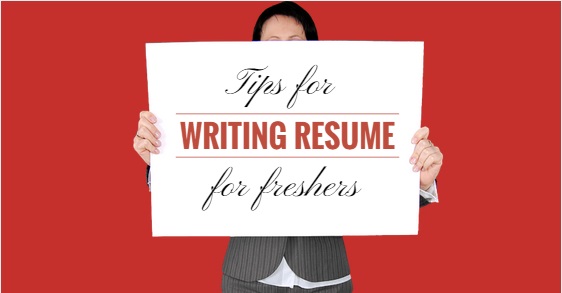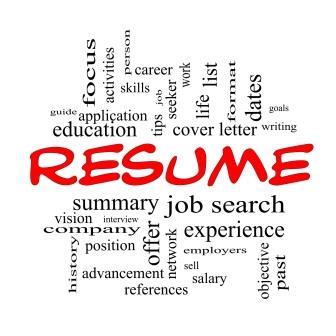What is a Resume:
A resume, by definition, is a document prepared with the primary motive of marketing an individual’s skill set, achievements and potential.
This document speaks precisely of the qualification, academic and professional, and focuses on the interest area of the candidate. This document must be so arranged that it provides maximum data at a glance.
The idea is to grab focus at the right keywords to produce maximum effect.
Therefore packaging is another skill which is important while putting together a winning resume. So here a re few tips to write attractive resumes for freshers.
 How to Write a Attractive Resume for Freshers:
How to Write a Attractive Resume for Freshers:
The following mentioned are few tips on how to make a resume for freshers or how to make CV for freshers.
1. Pre-plan your content for resume:
However, long before this packaging and data piling occurs on the document, much thought, study and planning is required.
Thoughts revolving around what you want to accomplish in your career will result in the answer to the most important question.
For a fresher, the professional background holds no value hence narrowing down to an interesting area often is a challenge. For the fresh graduates, the horizon is therefore wider.
2. Things to keep in mind before starting out with your resume:
While preparing your resume, first and foremost consideration is your typography – the font and the size.
Next, ensure the usage of good resume keywords. With some research, it is possible to learn to appropriately use them.
This must be followed by a proper resume format and a suitable file name. Usage of effectual titles should be considered.
Proper highlighting of qualities must be looked into. It is to be remembered that usage of action verbs are permitted in the resume but the use of pronouns is not.
In a resume the selection of a layout is important. This choice is dependent on your field of study, academic and professional skills and career plan.
3. Information that your resume must contain:
 Updated and correct contact information – your full name, address, phone number and email address.
Updated and correct contact information – your full name, address, phone number and email address.
Educational qualifications in chronological order – it is better to have this information associated with the names of the institutes that furnished the degrees or certificates. Mention professional qualification and/or training if undertaken.
Include specialized skill set, awards and achievements. As professional experience is not applicable for the beginners, so they can add career achievement in their resume.
4. Formulation of the resume:
There are steps in which you must proceed in order to structure your resume as per planning.
In the blank document start out with the margin and selection of fonts and sizes. In case of a document as formal as the resume, you have few choices of fonts viz, Times New Roman, Calibri, Arial or Georgia.
It is preferable to use font size 14 for headings and 12 for the information.
5. Avoid unnecessary formatting:
Avoid unessential capitalisation or use of bold letters. In the next step you select a layout.
Layouts are usually of 3 types –
- Chronological
- Functional
- Combinational
In short, the chronological type of resume is for people who have been associated with a single domain since a very long time.
6. Identify your type of resume:
Functional type is for those who do not have a great deal of matter or experience to support their resume with.
The third type is the combinational type of resume which as the name suggests, borrows features from the other two kinds.
Among these, the combinational kind is ideally suited for the fresh graduates.
7. Follow a pattern:
 To follow this pattern of layout, you must put down details of your education, projects undertaken for your Graduation or post Graduation courses, awards and achievements in order.
To follow this pattern of layout, you must put down details of your education, projects undertaken for your Graduation or post Graduation courses, awards and achievements in order.
Headings or titles are always left aligned. Use a single space before the section content and double spacing before another heading.
8. Use effective titles for headings:
Remember this is where you will be judged. You need to add an impressive resume objective statement.
Take care to construct the lines. It should not be a paragraph. One or two lines are sufficient.
Try not to sound too vague. It serves as a pointer to the position you want to see yourself in.
Do not use generic soft skills like ‘hard worker’, ‘team player’, ‘dynamic’ etc. Surely the employers expect these of you but do not like to read them on the resume.
9. Simplicity is the best policy:
For simplicity use sentences like this:
‘Responsibilities include preparing travel itineraries, booking flight tickets etc’ or ‘taking calls, categorizing them, resolving the issues etc’.
You may also use past tense when you are on transit. In such cases use phrases like ‘scheduled meetings ’, ‘supervised floor operations ’, ‘provided technical support’.
10. Personal credentials to be correct:
In the personal section include names of your parents, your date of birth, passport details, languages known and their proficiency level possessed.
Finally, try to limit your resume to a maximum of 2-3 pages for fresh graduates.
Remember, that there is no harm if your accomplishments are over by the end of the first page. It is wise not to ramble.
11. No Grammar mistakes:
 Pay attention to sentence constructions and grammar. Ensure that there is zero grammatical error in the document.
Pay attention to sentence constructions and grammar. Ensure that there is zero grammatical error in the document.
Make an effort to find out the appropriate expressions and spellings. Here is where you make an impression. Be formal and polite in approach.
Also, be precise in your statements. Remember that your training and accomplishments must have credibility in the form of a diploma or certificate.
12. Let your expertise speak:
Your area of expertise should show through your resume.
For instance, if you are a writer, your trade should reflect in your presentation without revealing that you are trying too hard.
Similarly, if you are an animation artist it should speak through your resume presentation without appearing gaudy.
These are the minor intricacies which make your resume exceptional but if you are not sure of them you may eliminate them. They are not necessary. Your resume is adequate even without them.
13. Things you must avoid:
Never use pictures in your resume. Exclude work experiences which are not supported by documents (eg: letters of appointment and release).
Do not write your expected salary, wait for an interview call, salary negotiation can happen there.
Do not put down references in your resume; they are important but furnish them on request only. There is no need to add your hobbies.
14. Add a professional touch to resume:
Apart from the forementioned details, it is important to realise that it is good to make the look and feel of your resume attractive, it should not be overdone so as to defeat its purpose.
The design should not appear unprofessional. It is okay to use colours but use them judiciously.
They should not clash with the formality of the tone of your resume. Remember, prospective employers have specific criteria for the selection of candidate.
How to Write a Resume If You Have No Experience?
You might have heard that “Your resume speaks more than you in an interview“. Well, it’s true and here starts your first step of preparing for an interview.
Your resume acts as your face front in the interview process and your selection of screening depends upon your resume purely. So the importance of the resume is very high. Sadly, this is the one point which most freshers do not focus on.
When creating a resume for an interview, there are many candidates who get confused on things like what to include, the format of a resume, sections etc, this happens mostly with freshers.
Preparing a resume without any experience is surely a tough task. Now if you to want to create an effective resume and are confused on how to do it then, here are few tips to follow which can help you out.
Basic Fresher Resume Issues:
- Should be readable, relevant and informative
- Research about the employers and then craft your resume
- Address the requirement of the employer
- Provide solid facts
Formatting Your Resume:
- Split the resume into sections and segments
- Focus on important information like academic, project work etc
- Maintain a professional look
- Do not make it look congested
Basic Fresher Resume Layout:
- Name and Contact in bigger fonts
- Clear mention of objective
- Qualifications
- Skills and abilities
- Relevant experience
- Achievements
In the end, make sure that your resume is complete as a half baked resume will surely land up in the trash.
Conclusion:
Unless your resume addresses those particularly they may be rejected through screening software. Also, bear in mind that your basic information remains the same but you might have to make modifications to cater to different employers or different businesses.
Finally, go through your complete resume and search for typos before taking out a hard copy.











































